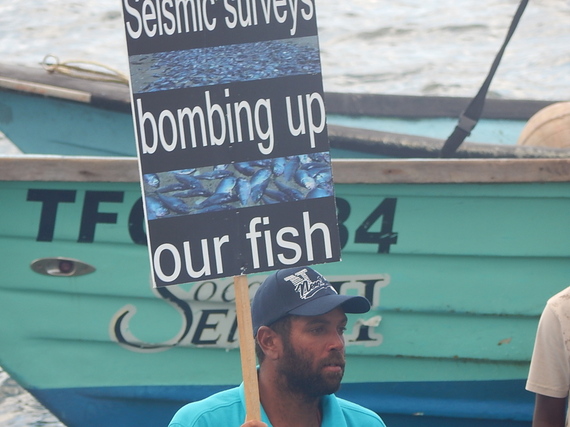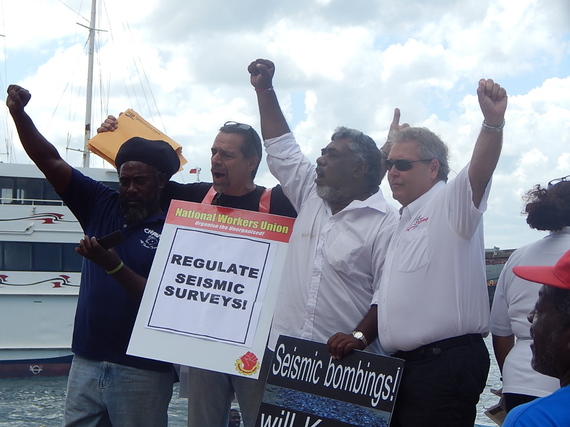Members of a small nation with the hearts of a lion are standing up to big oil in order to protect fish, and their fishing way of life.
"We don't just want to hear about meagre compensation for our financial hardships. We want to fish, living the way we've lived for thousands of years. This is our legacy, our right and what we know best. It seems to be a case of feeding the rich and depriving the less privileged. We are scattered all over Trinidad and Tobago which makes it easy to divide, fool and conquer us to get us out of their way as they have done just last week with our fellow fishers on the south coast, who accepted the untruths and inadequate packages dangled at them, as we once did, because of their financial distress and ignorance, just as ours, distress which is counted on to weaken our resolve and fool you, the public." Diane Christian-Simmons
Fed up with trying to work through government channels, the fishing community of Trinidad Tobago has held a series of peaceful pickets to protect the fish that have fed their nation for thousands of years - fish that are known to be harmed by oil companies in the seemingly unquenchable offshore quest for oil and gas.
The latest peaceful picket resulted in the dramatic arrest of Gary Aboud, head of Fishermen and Friends of the Sea (FFOS), environmentalist Cathal Healy-Singh and La Brea fisherman, Wayne Henry.
Gary Aboud, head of Fishermen and Friends of the Sea (left), Diane Christian-Simmons, president of the Cocorite fishing association (center), and environmentalist Cathal Healy-Singh (right). This statement accompanied the press conference.
The situation in Trinidad Tobago is particularly complex because that well-educated nation enjoys a good standard of living in many sectors as a result of the extensive oil reserves that have built the economy, and which created a government that is closely tied to the industry.
In a press release, Fishermen and Friends of the Sea note that the Environmental Management Authority (EMA) has never required Environmental Impact Assessments (EIA) before seismic surveys for oil and gas are undertaken. They understand that oil exploration will undoubtedly occur there, but they are requesting something very significant: They just want basic science to figure out the degree of impact on fisheries, and they want the fish stock restored.

"Bombing" is a colloquial term for the seismic surveys, the fishermen (colloquially referred to as 'fisherfolk') understand the science of seismic surveys. Photo courtesy of Christian-Simmons.
The fishing community demands reasonable compensation from the oil industry for loss of income. The next oil survey will keep them from the area for eight months, and studies show that the fish may disappear from the region due to the noise.
Arrested in last week's protest, environmental engineer Cathal Healy-Singh has documented the situation there in detail, and provided the information to the government.
There is a plethora of scientific data worldwide which concludes that Seismic Surveys (SS) are damaging to not only marine mammals but also to fish and other marine organisms. In 2011, Fishermen and Friends of the Sea, presented to the EMA (and all relevant government agencies and fishing groups) a substantial technical document which compiles the results of scores and scores of research papers from scientific groups around the world which clearly and unequivocally recognizes the damage that SS does. "During the last 20 years there has been growing concern with respect to the impacts of offshore SS activities on marine life"
From the press release:
Since they [EMA] failed to require EIAs in the past, there is no documented evidence of where, how much and what types of fish are being caught, and what the impacts of previous specific Seismic Surveys have been on national fisheries and particularly commercial fisheries, since only the landing sites and gross quantities caught are intermittently documented by the Fisheries Division (according to fishermen).
As a result, the EMA is not in a position now, nor will they be after the Guidelines are written, to "ensure that offshore activities are conducted in a regulated manner". Hence they would have failed to "uphold principles of sustainable development"
Everyone is now fully aware of the grave concerns of fishermen forced, precisely because of a lack of consultations, to have to come into the full public gaze and demonstrate peacefully at the POS waterfront. They are reporting up to 70% drop in catch; lasting months after the Seismic Surveys are completed.

What is the status of the three people who were arrested at the recent rally in Port of Spain?
The three persons who were arrested at our peaceful picket - which in our country is not against the law and needs no permission from any authority - are battered and nursing bruises and are currently out on bail but must re-appear in court on December 18th 2013 to answer charges along the lines of: failure to inform the commissioner of police before holding a public meeting, failure to disperse when told to do so by the officer in charge, holding an public demonstration without seeking permission and Cathal has an additional charge of obstruction of justice because he held on to Gary while the police were taking him away.
Some fish populations are collapsing worldwide, are there controls on fishing practices there that keep the fishery viable?
There are some out dated controls but no enforcement, however the overfishing stems from the trawling being allowed to take place which our government has refused to ban for the twenty plus years which our artisanal fleet have been calling on them to do as they are the ones destroying the sea beds and killing all forms of marine life indiscriminately. Even though our government has now promised a partial ban on trawling, it will not come into effect for another two years. With Trawling and Seismic Surveys combined our fishery is doomed.
BP points out that this seismic technology is used worldwide and they follow the same protocols everywhere.
They have said that seismic surveys are done with pressure waves created by airguns, but what they have not said is that the decibel level generated by these airguns are more than double that of a jack hammer, the decibel level of which is devastating to the human eardrum and that sound travels farther in water than in the air. If this is so, is the sound of those airguns not even more devastating to all marine life whose hearing is much more sensitive than us humans. This technology may be used worldwide but the difference is that in those other countries world wide, they cannot perform seismic surveys in nursery area, spawning grounds, during spawning times or on migratory paths such is not the case here in Trinidad and Tobago.
It has been shown that the noise disrupts fisheries and causes stranding of dolphins and whales worldwide as well. Given that, do you feel that the oil industry argument - that they do it everywhere - has any validity if they are causing destruction everywhere?
No, because an action is "done everywhere" in spite of its known devastating effect, does not make it right regardless of its necessity.
How do you think the community as a whole will be affected if fishing is not sustainable there?
Our community will/has been negatively affected, many of us can no longer earn a living, maintain our families, pay our bills, families where the father is the fisherman and sole provider have been destroyed because they have been plunged into poverty causing them to separate. Others have lost their boats and homes because they cannot make enough money to pay their loans. I, myself have been forced to sell my boat in order to pay some of my bills and now have to rely on the mercy of other family members. The list goes on.
***
Theirs is a courageous effort, one which is brewing just below the surface in countries the world over as dolphins die, deep sea animals wash up on beaches, and fish stocks disappear in the wake of the ceaseless cacophony of the oil exploration. Standing up to government or big industry can be uncomfortable and dangerous - standing up to both takes a measure of commitment and passion that most of us are not required to demonstrate in our lives.
The eyes of the world are watching over this courageous community, hopefully offering a measure of support and security. It is one planet, one ocean, and we are all in it together.

